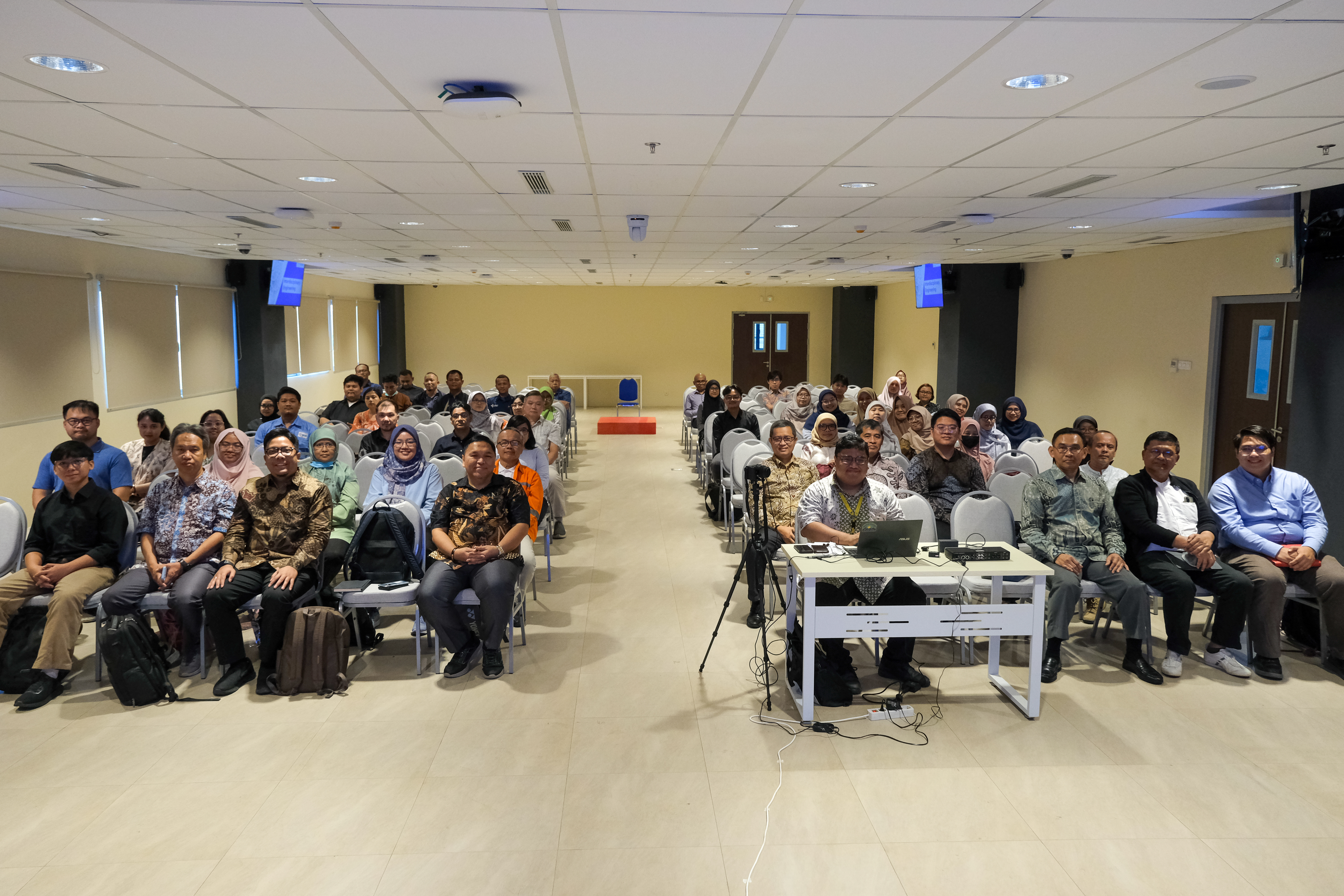On October 21, 2025, the Center for Sustainability and Waste Management, Universitas Indonesia (CSWM UI), in collaboration with the Indonesian Polymer Association (HPI), held the HPI Scientific Forum themed “Pyrolysis as a Solution for Plastic Waste Management: Research, Implementation, and Policy” at the Smart Auditorium IDE, Faculty of Engineering, Universitas Indonesia (FTUI). The forum featured three speakers from the industrial and governmental sectors who discussed the challenges and opportunities in implementing pyrolysis technology in Indonesia.
Pyrolysis technology offers an innovative solution to convert plastic waste into valuable products such as fuel oil, syngas, and wax through a heating process conducted in the absence of oxygen. The HPI Scientific Forum was designed as a platform for knowledge exchange and multi-sector collaboration among academia, industry, and government to discuss recent research, industrial implementation practices, and supporting policies for pyrolysis technology development. The event served as a strategic forum to share research findings, practical experiences, and policy insights aimed at advancing a circular economy approach for sustainable plastic waste management in Indonesia.
The Chairman of HPI, Prof. Dr. Mochamad Chalid, S.Si., M.Sc.Eng., emphasized the importance of cross-sector collaboration in achieving sustainable plastic management. “The issues of plastic and sustainability cannot be solved by one sector alone. We need collaboration among academia, businesses, communities, and the government so that innovations can deliver real impact,” he stated.
Fajar Budiono, representing the Indonesian Olefin, Aromatic, and Plastic Industry Association (INAPLAS), opened the session by explaining that chemical recycling is a strategic solution to overcome the limitations of mechanical recycling methods commonly used in the plastic management industry. He highlighted that this system enables the conversion of non-recyclable plastic waste into fuel, energy, or new chemical feedstocks with economic value. Fajar also noted that relevant regulations, such as Presidential Regulation No. 109 of 2025, have opened broader opportunities for the development of chemical recycling technologies and the utilization of Refuse-Derived Fuel (RDF) as an alternative energy source.
Meanwhile, Idham Padmaya Mahatma from PT Chandra Asri Pacific Tbk shared insights on the industrial implementation of pyrolysis technology. “Pyrolysis is not a combustion process—it is heating without oxygen that breaks down the carbon chains in plastics into fuels such as diesel and kerosene,” he explained. He added that this technology offers a promising solution for plastic waste management in Indonesia. “We view plastic waste not as garbage, but as a resource with economic potential. Through the pyrolysis system we developed in Cirebon, the processed products have been utilized as alternative fuel by small industries such as batik artisans and livestock farmers,” said Idham. He also expressed hope for stronger regulatory support and government incentives to accelerate the wider adoption of this technology in Indonesia.
From a policy perspective, Trois Dilisusendi, S.T., M.E., CRMO., from the Ministry of Energy and Mineral Resources (ESDM), explained that waste processing has significant potential as a renewable energy source to support national energy independence. He elaborated that the Ministry is currently developing waste-to-energy utilization schemes through various technologies such as Refuse-Derived Fuel (RDF), biomass, biogas, and pyrolysis, which can produce electricity, fuel, and bioenergy. Recent regulations, such as Presidential Regulation No. 109 of 2025, provide a foundation for strengthening the implementation of waste-to-energy programs by simplifying licensing procedures and standardizing waste-derived fuel products. Trois emphasized the importance of cross-sector collaboration—including local governments, industry, and academia—to ensure the sustainability of supply chains and production efficiency for waste-based energy in Indonesia.
The Dean of FTUI, Prof. Kemas Ridwan Kurniawan, S.T., M.Sc., Ph.D., also expressed his appreciation for the event. “FTUI is committed to being a catalyst that connects research, innovation, and public policy. This forum demonstrates how universities can actively contribute to developing measurable solutions for environmental and sustainability challenges,” he stated. He further added that such initiatives reflect FTUI’s spirit in fostering a research culture with social and economic impact, aligned with the university’s vision as a center of sustainable innovation.
Through this forum, CSWM UI and HPI reaffirmed the importance of building a collaborative and applied research ecosystem. With interdisciplinary and cross-sectoral support, research outcomes are expected to be practically implemented in advancing Indonesia’s transition toward efficient, low-emission, and sustainable plastic waste management.
***
Public Communication Office
Faculty of Engineering, Universitas Indonesia







